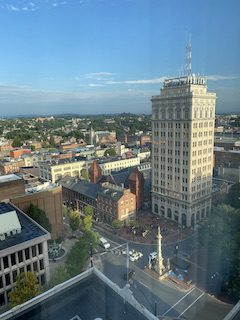Was any part of my memory true?
Ten years ago, I wrote about memories of the day a fast-moving snow storm dumped several inches of snow on southern Connecticut—before Halloween. I was in high school at the time. In the middle of the day, school administrators made the unprecedented decision to close school.
We neighborhood kids milled around the foyer asking, “Has the bus come yet? Have you seen it? Is it parked in the usual spot?” Buses arrived willy-nilly and left with only a few students aboard. I wasn’t one of them. So, I waited in line to use the office phone to call my mother. She was not pleased but came anyway. That day, I was glad for her fury, because her gumption was the only way we made it home through the two-foot drifts.
I’ve told this story several times over the years, but something didn’t ring true. So, I checked the weather history for Connecticut during my growing up years and discovered that storm never happened. The only recorded snow before Halloween in Connecticut occurred in 1979, 1987, and 2011—long after I’d graduated from high school.
Had I conflated the snow before Halloween with another storm, or mis-remembered the entire event? Though memory of my mother’s wrath was vivid, the discrepancies made we wonder.
***
There’s no such thing as truth in memoir writing.

When writing memoir, we put our memories into story form to help us integrate them, according to psychologist John Teske. I attended his fascinating presentation during HippoCamp in Lancaster, Pennsylvania this past weekend. “Most people remember the ‘peak’ event,” he said, “because sometimes it’s the obstacle that makes a good story.” As with my fast-moving snow storm.
“What if you were told that that memory never happened?” Teske asked. “The stories we tell the most often get changed; the memories we feel more confident about are precisely the ones that are less reliable.” I shifted uncomfortably in my chair.
There’s no such thing as truth in memoir writing, according to Teske. “Memoires are collaborative; we add things in. It’s hard to deal with this, the motivation about why we remember and how. Is it honesty or lies?” Our egos are built out of a series of self-deceptive tricks, he explained. Honesty is not how memory works; it’s about how emotions work, what our memories are about: feelings.
So, in writing memoir, we construct stories to help us make sense of our pasts, especially the untellable. But beware of those constructed memories, Teske warned. “Ask yourself: where is the camera? Are you really there? Is the camera view from your eyes? If not, the memory is probably constructed, a remembered movie.”
***
Our memories do not tell the truth.
Growing up in the 50s and 60s, daylight savings time meant time to play after supper and endless days of summer ahead. Return to standard time in the fall meant the beginning of school, dark and homework after dinner. Or did it?
With a little research, I discovered that ‘spring forward’ happened in late April until the mid-80s and earlier thereafter—long before the end of school in June. When I started kindergarten in 1956, ‘fall back’ happened in late October. So, my memory of beginning school after Labor during standard time was flawed, too. I’d constructed movies based on my emotions: summertime joy and something less than that for school.
So, memoirists beware. Our memories are tricksters. They do not tell the truth.



That is actually scary Carole. I’m an old story teller. What if I just have a spilled marbles imagination and many marbles are missing?
One story I do not know much of is true as I can look at my scars. They are still there. Christ’s are too.
Indeed, the way we store memories should prompt us to question. And while we often embellish, a good storyteller selects carefully, as with the parables, and points to the scars.
Great post, Carole! That’s the joy of story — even what’s true might not be fully true and what’s made up might not be fully made up.
Thanks, Vonetta! How’s motherhood and writing going?
I love this. So true. So honest.
Thank you, my friend, and for your lovely hospitality!
Carole, while I take pride in my “nearly” excellent memory, I am sure my own view of certain past events may take on a slightly distorted truth. Thanks for jarring my own memory bank a little bit. My, it sure gets dusty up there.
Stories are creative nonfiction, and sometimes the emphasis is more on the creative part. Thanks for your comment, Richard!